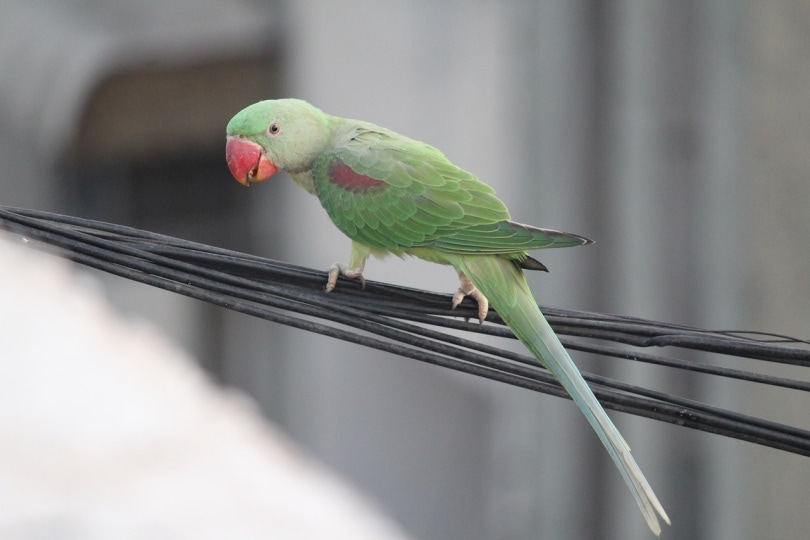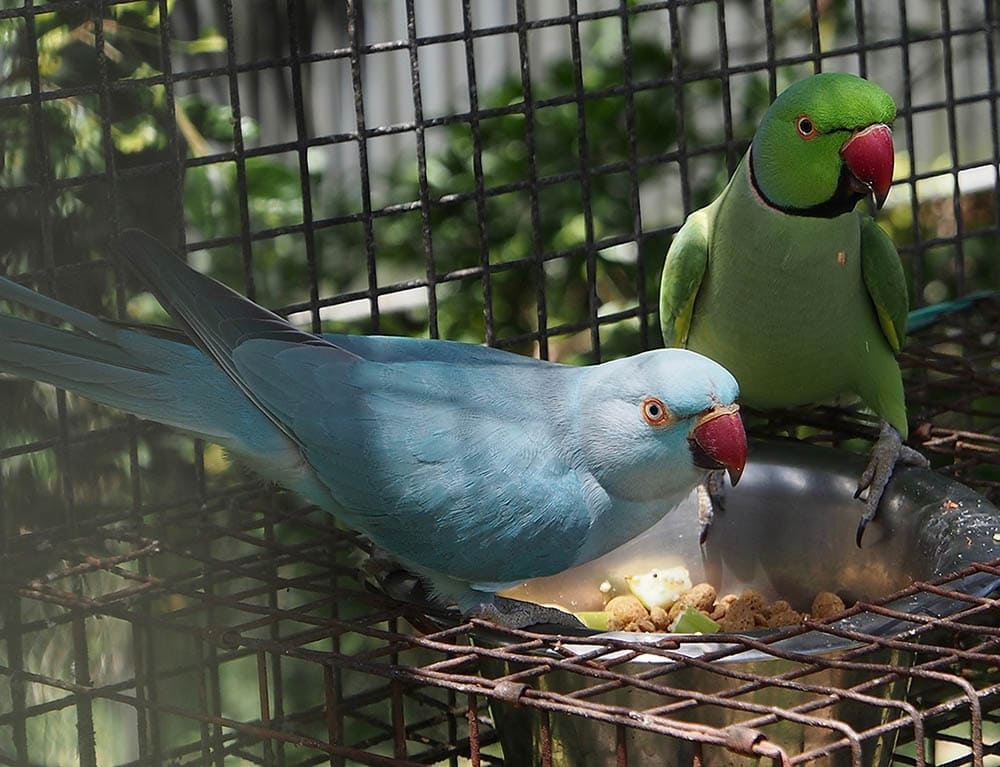
If you’re interested in adding a bird to your home, both the Indian and African Ring-Necked Parakeets can be great choices. But at first glance, these two birds can seem identical.
So, what’s the difference between an Indian and African Ring-Necked Parakeet, and how much does it matter when choosing one for your home? Moreover, do they have any specific care requirements?
We answer all those questions and more here. Not only will you know the difference between the two birds, but you’ll also know which one is better for your home.
Visual Differences

At a Glance
Indian Ring-Necked Parakeet Overview

The Indian Ring-Necked Parakeet is an outstanding family pet for various reasons. For starters, they’re extremely social and interactive, which makes training them a blast. Moreover, they’re great talking birds, and you can teach them over 200 words!
However, they require a ton of attention and can be a bit temperamental if they feel like you’re ignoring them, so you need to ensure that you have plenty of time in your schedule to care for them.
Personality/Character
The Indian Ring-Necked Parakeet is an extremely intelligent and curious bird with a sweet and charming personality — when you give them enough attention.
However, if you don’t give them the attention that they crave, they can quickly turn moody and nippy, which can make them a frustrating pet to own. Moreover, they’re not overly affectionate birds, even when you do give them the attention that they crave.
While that’s fine for many owners, others want a more cuddly bird to hang out with throughout the day.
Common Health Problems
The Indian Ring-Necked Parakeet is an extremely healthy bird, but their health can quickly deteriorate if you don’t care for them properly. Common health problems include respiratory infections from a dirty or dusty environment or self-mutilation from a bird that’s not getting enough attention.
Feather plucking is a common sign of this, and they’ll likely nip at you until they are in a better mood.

Exercise Requirements
Like all birds, an Indian Ring-Necked Parakeet needs tons of exercise to stay happy. This means at least 3 hours out of their cage each day, but the more time that they can spend out of their cage, the better.
If they don’t get enough exercise, their muscles will start to deteriorate, and they can become depressed. Both situations will lead to health concerns that you’ll need to address with a vet.
Cage Requirements
An Indian Ring-Necked Parakeet is a larger parakeet and as such, requires a 30″ x 30″ x 36″ cage to keep them happy. The bar spacing should be between ½” and 5/8″, as this will keep them from getting their head or body stuck between the bars.
Furthermore, since they are extremely intelligent birds, you need to include plenty of toys and rotate them out weekly to stimulate them intellectually. You should also include perches and things in their cage for them to climb on to meet their exercise requirements.
Suitable for

The Indian Ring-Necked Parakeet is an excellent choice for those with families and those who have plenty of time to devote to a new companion. However, if you live in tight living quarters, like an apartment, the Indian Ring-Necked Parakeet can be a bit too noisy.
Still, while they can be a bit temperamental, if they get the attention that they need, then they’re great around people and kids of all ages and do well with other pets.
African Ring-Necked Parakeet Overview

While Indian Ring-Necked Parakeets and the African Ring-Necked Parakeets are similar in many ways, the African Ring-Necked Parakeet tends to be a bit more docile and better suited for beginner handlers.
African Ring-Necked Parakeets also tend to be smaller, which means you can get by with a smaller cage, which can be a lifesaver in tighter living conditions.
Moreover, while these birds can undoubtedly be noisy, they generally aren’t as loud as other parakeets if they have all their needs met.
Personality/Character
If you’re trying to find a playful and intelligent bird that has a docile nature, the African Ring-Necked Parakeet might be just what you’ve been looking for. These birds are extremely intelligent and always aim to put a smile on your face.
They’re goofy, playful, and full of energy, making them a great addition to many homes. Moreover, they rarely nip if you’re meeting all their needs, making them an excellent choice for a family.
Common Health Problems
The African Ring-Necked Parakeet is an extremely hardy bird with few health concerns if you care for them properly. Still, like all birds, they can display a few different health problems if you neglect their conditions.
Common problems include:
The best way to prevent these illnesses is to give them a well-rounded diet, keep their enclosure clean, and provide them with plenty of attention. If you do notice that your parakeet is displaying any health concerns, you need to take them to the vet as soon as possible.
African Ring-Necked Parakeets will hide illnesses as long as possible, so when you start to notice signs, it’s already quite serious.
Exercise Requirements

Like all birds, the African Ring-Necked Parakeet needs tons of exercise to stay healthy and happy. They need at least 3 hours outside of their enclosure every day, and more active birds will require even more time.
They should also have plenty of perches and things to climb on inside their enclosure to keep them happy and healthy.
Cage Requirements
Since the African Ring-Necked Parakeet is a little smaller than the Indian Ring-Necked Parakeet, they can have a slightly smaller enclosure. We still wouldn’t get anything smaller than 24″ x 24″ x 36″, and they’ll appreciate a larger cage with more room to roam.
Besides a large enough cage, you need to have plenty of toys, perches, and things to climb on to keep them both physically and intellectually stimulated. You should cycle out their toys weekly to keep them from mastering them.
It would also help if you had toys outside for them to play with when they’re exercising.
Suitable for
The African Ring-Necked Parakeet is an excellent pet for families or those with extra time on their hands. They make great companions, but even though they are quieter birds, they’ll still make noise. So, if you live in close quarters with other people, they aren’t a great choice.
Furthermore, since they require 3-4 hours of attention daily, they aren’t the best fit if you have a busy schedule. Also, keep in mind that they can live for up to 40 years, so if you’re older, you need to have a plan on where they’re going to live if you’re no longer around.
Which Breed Is Right for You?
While there’s no wrong choice, if you’re a novice bird handler, the African Ring-Necked Parakeet is a bit easier to handle and meet all their daily requirements. Moreover, they’re not as loud but they’re still great talkers.
Still, if you want a larger bird that can learn tons of words even if they’re a little more aloof, the Indian Ring-Necked Parakeet is a great choice too.
In the end, the most important part is that you devote enough time to your new bird. Otherwise, you’ll run into problems no matter which bird you choose to buy.
See Also:
Featured Image Credit: Up – Ditney, Pixabay; Down – reganrondricks0, Pixabay









